#lady dìs
Text
Young lady Dìs and frerin before smaug
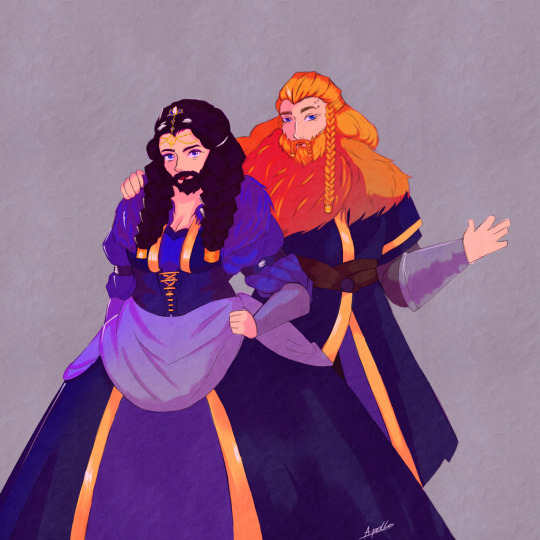
My favorite headcanon is that both of Thorin's younger siblings had better beards and hair than him
#the hobbit#the hobbit fanart#lady dìs#frerin durin#dís durin#the royal line of Durin#durin royal family#art#fanart#my art#dwarrowdam#dwarf#lord of the rings#lotr#blue and gold#artist on tumblr
52 notes
·
View notes
Text
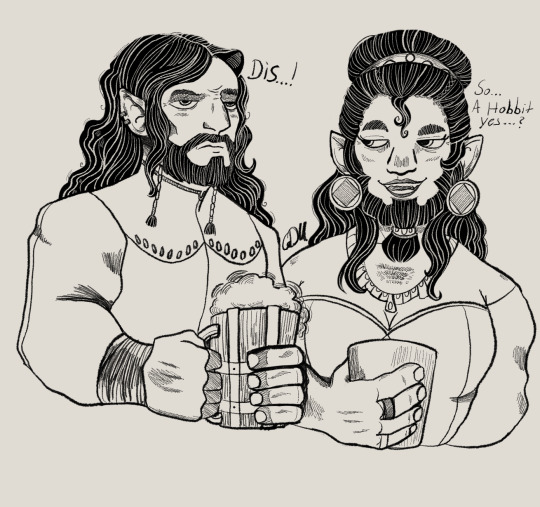
„And a Burglar as well!“
#the hobbit#thorin oakenshield#lady dis#bagginshield#Dìs being annoying on purpose#love them both#my art
217 notes
·
View notes
Text
can’t wait to meet up with the friend I see everyday for lunch and debate on lotr as we’ve been doing for the past two months
5 notes
·
View notes
Text
Why is Opera music so slept on?? Where is more???
I just had the most mind-scrunching, toe-curling, eye-drenching, stomach-dropping experience as I listened to the climax of "Un bel dì vedremo"
Anyway, opera recommendations - they may be basic but don't be a snob add your own instead. Also only partial title because they can be too long for me to type out.
Puccini: Madama Butterfly, Act 2: "Un bel dì vedremo"
Barcacolle (the one with the lady's face on the cover)
Celia: Adriana Lecouvreur, Act 1: "Ecco, respiro appena...."
Puccini: La boheme, Act 3: "Donde lieta usci al tou...."
Les Contes d'Hoffmann, Act 3: "Belle nuit, o nuit d'amour"
The Flower duet (you'll probably recognise this one)
Yes, I do have a Maria Callas bias. Listen to her songs though, she has pipes.
33 notes
·
View notes
Note
If He Yan and Cao Pi were raised together like brothers (even though they were not technically or legally brothers), when did their relationship collapse? Is there any indication that Cao Cao disliked He Yan due to He Yan's various issues?
Cao Pi always hated He Yan but Cao Cao was fond of him.
This passage from Cao Shuang's biography should cover most of it.
[Hé] Yàn was Hé Jìn’s grandson. His mother lady Yǐn became Tàizǔ‘s consort. [Hé] Yàn grew up in the palaces, was also bestowed with a princess, and when young for his exceptional talent was well known. He liked Lǎo’s and Zhuǎng’s teachings, and composed Dàodé Lùn and various literature and rhapsodies and writings altogether ten piān.
Wèilüè states: At the time Tàizǔ was Excellency of Works, he accepted as concubine [Hé] Yàn’s mother and also adopted [Hé] Yàn. At this time Qín Yílù’s son Ā’sū also accompanied his mother to the Excellency’s house, and both met with favor like the Excellency’s sons. Sū was [Qín] Lǎng. Sū by nature was cautious and prudent, but [Hé] Yàn had nothing he feared, his clothes and adornments imitated the Heir-Apparent’s, and therefore Wén-dì [Cáo Pī] specially detested him, always not calling his surname and appellation, always calling him ‘False son.’ [Hé] Yàn was bestowed with princess, and also was lecherous, and therefore during Huángchū’s [220-226] time he had no appointment. When Míng-dì was enthroned, he was sidelined in superfluous offices. Reaching Zhèngshǐ’s beginning, he attached to Cáo Shuǎng, and also because he had talent and ability, therefore Shuǎng employed him as Cavalier Attendant Cadet, promoted to Attendant Internal Secretariat Documenter. [Hé] Yàn previousy was bestowed with princess, obtained noble rank as a Ranked Marquis, and also his mother was in the Inner court, and so [Hé] Yàn by nature cared for his own pleasure, in all activities white cosmetic powder did not leave his hands, when walking he looked back at his shadow. [Hé] Yàn became Secretariat Documenter, managed selections and promotions, and of those he was close to for a long time, many were selected for promotion.
5 notes
·
View notes
Text
Imperial Chinese Harem Systems part 3
Western Han
Empress (皇后 ; huáng hòu)
Lady of Bright Deportment (昭儀; zhāo yí)
Lady of Handsome Fairness (婕妤; jié yú), created by Emperor Wu
Lady of Graceful Beauty (娙娥; xíng é), created by Emperor Wu
Lady of Lovely Countenance (容華; róng huá), created by Emperor Wu
Lady of Complete Deportment (充衣; chōng yī), created by Emperor Wu
Beauty (美人; měi rén)
Virtuous Lady (良人; liáng rén)
Consort (八子; bā zi)
Lady (七子; qī zi)
Senior Palace Woman (長使; zhǎng shǐ)
Junior Palace Woman (少使; shǎo shǐ)
Lady for Miscellaneous Uses (五官; wǔ guān)
Lady of Complaisant Constancy (順常; shùn cháng)
Lady Without Impurity (舞涓; wǔ juān), Lady of Reverent Gentleness (共和; gòng hé), Lady who Pleases the Spirit (娛靈; yú líng), Lady who Could Comfort a Multitude (保林; bǎo lín), Lady of Excellent Employment (良使; liáng shǐ), Lady for Night Attendance (夜者; yè zhě)
The principal wife of the Crown Prince was called (妃; fēi). There also exists a sub-ranking system for concubines; they were called Ladies of Excellence (良娣; liáng dì) and (孺人; rú rén). For grandchildren of the Emperor, their principal wives were called Madame (夫人; fū rén). Concubines for these people have no titles, and were simple called (家人子; jiā rén zǐ).
Eastern Han
Empress (皇后; huáng hòu)
Noble Lady (貴人; guì rén)
Beauty (美人; měi rén)
Courtier (宮人; gōng rén)
Talented Lady (才女; cǎi nǚ
No limits were set for these consorts. This later created situations when more than 20,000 women were living in the palace during the reigns of Emperor Huan and Emperor Ling.
Three Kingdoms
Cao Wei
During the reign of Cao Cao (who was not an emperor but a king):
Queen (王后; wáng hòu)
Madame (夫人; fū rén)
Lady of Bright Deportment (昭儀; zhāo yí)
Lady of Handsome Fairness (婕妤; jié yú)
Lady of Lovely Countenance (容華; róng huá)
Beauty (美人; měi rén)
During the reign of Emperor Wen:
Empress (皇后; huáng hòu)
Madame (夫人; fū rén)
Noble Imperial Concubines (貴嬪; guì pín)
Lady of Pure Beauty (淑媛; shū yuàn)
Lady of Bright Deportment (昭儀; zhāo yí)
Lady of Cultivated Countenance (修容; xiū róng)
Lady of Handsome Fairness (婕妤; jié yú)
Lady of Lovely Countenance (容華; róng huá)
Lady of Humble Capability (順成; shùn chéng)
Beauty (美人; měi rén)
Virtuous Lady (良人; liáng rén)
During the reign of Emperor Ming:
Empress (皇后; huáng hòu)
Madame (夫人; fū rén)
Noble Imperial Concubines (貴嬪; guì pín)
Pure Consort (淑妃; shū fēi)
Lady of Pure Beauty (淑媛; shū yuàn)
Lady of Bright Deportment (昭儀; zhāo yí)
Lady of Bright Magnificence (昭華; zhāo huá)
Lady of Cultivated Countenance (修容; xiū róng)
Lady of Cultivated Deportment (修儀; xiū yí)
Lady of Handsome Fairness (婕妤; jié yú)
Lady of Lovely Countenance (傛華; rǒng huá)
Beauty (美人; měi rén)
Virtuous Lady (良人; liáng rén)
Northern & Southern Dynasties
Liu Song
1 Empress (皇后; huáng hòu)
3 Madames (夫人; fū rén) Noble Imperial Concubines (貴嬪; guì pín), Consort (夫人; fū rén), and Noble Lady (貴人; guì rén)
9 Imperial Concubines (嬪; pín) Pure Consort (淑妃; shū fēi), Lady of Pure Beauty (淑媛; shū yuàn), Lady of Warm Ceremony (淑儀; shū yí), Lady of Cultivated Splendidness (修華; xiū huá), Lady of Cultivated Countenance (修容; xiū róng), Lady of Cultivated Deportment (修儀; xiū yí), Lady of Handsome Fairness (婕妤; jié yú), Lady of Everlasting Splendidness (傛華; yǒng huá), and Lady of Sufficient Splendidness (充華; chōng huá)
Beauty (美人; měi rén)
From 456, during the reign of Emperor Xiaowu:
1 Empress (皇后; huáng hòu)
3 Madames (夫人; fū rén) Noble Consort (貴妃; guì fēi), Noble Imperial Concubines (貴嬪; guì pín), and Noble Lady (貴人; guì rén)
9 Imperial Concubines (嬪; pín) Pure Consort (淑妃; shū fēi), Lady of Pure Beauty (淑媛; shū yuàn), Lady of Warm Ceremony (淑儀; shū yí), Lady of Bright Deportment (昭儀; zhāo yí), Lady of Bright Countenance (昭容; zhāo róng), Lady of Bright Splendidness (昭華; zhāo huá), Lady of Handsome Fairness (婕妤; jié yú), Lady of Lovely Countenance (容華; róng huá), and Lady of Sufficient Splendidness (充華; chōng huá)
Beauty (美人; měi rén)
Lady of Regular Talents (中才人; zhōng cái rén)
Lady of Complete Deportment (充衣; chōng yī)
From the reign of Emperor Ming:
1 Empress (皇后; huáng hòu)
3 Madames (夫人; fū rén) Noble Consort (貴妃; guì fēi), Noble Imperial Concubines (貴嬪; guì pín), and Noble Concubine (貴姬; guì jī)
9 Imperial Concubines (嬪; pín) Lady of Pure Beauty (淑媛; shū yuàn), Lady of Pure Deportment (淑儀; shū yí), Lady of Pure Countenance (淑容; shū róng), Lady of Bright Splendidness (昭華; zhāo huá), Lady of Bright Deportment (昭儀; zhāo yí), Lady of Bright Countenance (昭容; zhāo róng), Lady of Cultivated Splendidness (修華; xiū huá), Lady of Cultivated Deportment (修儀; xiū yí), and Lady of Cultivated Countenance (修容; xiū róng)
5 (職; zhí)
Handsome Fairness (婕妤; jié yú)
Lady of Lovely Countenance (容華; róng huá)
Lady of Sufficient Countenance (充華; chōng huá)
Lady of Inherit Honor (承徽; chéng huī)
Lady of Kind Honor (列榮; liè róng)
Beauty (美人; měi rén)
Lady of Regular Talents (中才人; zhōng cái rén)
Lady of Talents (才人; cái rén)
Lady of Virtue (良人; liáng rén)
Lady of Complete Deportment (充衣; chōng yī)) Handsome Fairness (婕妤; jié yú)Lady of Lovely Countenance (容華; róng huá), Lady of Sufficient Countenance (充華; chōng huá), Lady of Inherit Honor (承徽; chéng huī), and Lady of Kind Honor (列榮; liè róng)
Beauty (美人; měi rén)
Lady of Regular Talents (中才人; zhōng cái rén)
Lady of Talents (才人; cái rén)
Lady of Virtue (良人; liáng rén)
Lady of Complete Deportment (充衣; chōng yī)
#historical chinese harem system#western han#eastern han#three kingdoms#cao wei#northern and southern dynasties#liu song
38 notes
·
View notes
Text
Why I don’t write in Vietnamese?
For those of you who doesn’t know, I am Vietnamese. I’m fluent in Vietnamese but my teachers would probably disagree. I live in Vietnam. So the moment I started writing fanfics, my Vietnamese readers has been hounding me with one question: why don’t you write in Vietnamese?
I would like to ask them why not write in English, but I held back. My best and first experiences with fanfics were all English. I support very niched characters which have little following in the world, let alone my country. So I would like to give back.
Back then, there wasn’t Ao3. Fanfiction.net was the most organized of all the sites. I could easily find what I searched for there. And most of the fanfics are in English.
As a fan of a niched character, I don’t have a lot of choices. I know too well the pain of google translating Italian, French, Japanese, Chinese, … so I want to make my works as accessible as possible. And the most popular/longest Vietnamese fanfic about Vermouth is a sappy crappy chat story (which I can’t explain to you how bad it is without swearing). I can count the decent Vietnamese fanfics about Vermouth on one hand. So yeah … I have little connection to that community.
On the logical front, if you write in English, people will read even though they aren’t from English speaking countries. English is the world language after all. If you write in a so-called niche language, most will just pass.
Next question: Why not translate into Vietnamese?
Simple, I can’t. I technically and literally can not. I’ve tried and I failed. Here, you may be confused. I’m fluent in both languages and yet I can’t translate my own works? Let me explain.
In English, you have two main pronouns “you” and “I”. In Vietnamese, to express “you” and “I”, we have: tôi, bạn, anh, chị, em, cô, dì, chú, bác, cậu, mợ, mày, tao, … and more. Much more. How you use a pronoun will determine the age, sex, relationship, mood, standing of a person in dialogues.
Welcome to the confusing and wonderful maze of Vietnamese pronouns!
For example, take this simple dialogue:
Kate: Shu! (Kate addresses Akai by his nickname).
Now, this is extremely, extremely rude in Vietnamese. A child does not, under any circumstances, address an adult by his name alone. A pronoun is added to show respect. Basically, when you call someone with the wrong pronoun, you’ll physically cringe.
Ok, so let’s add the appropriate pronoun which is “chú” - uncle.
But now, I have a problem.
Kate: Uncle Shu!
Gin: What did you just say? Who’s your uncle?
To maintain the integrity of the characters, I have to rewrite a large portion of the dialogues and some of the plot. But it would become a different story all together. So I don’t.
Fun random fact:
In Gordon’s Great Escape, he was mistaken. Dì Hai (the lady on the floating market in Vietnam) isn’t her name. Dì means aunt. It’s a universal way to address an older lady or your aunt. Hai means she is the oldest of her siblings. Dì Hai is basically a nickname. When I heard him calling Ms. Di Hai, I just laughed. And no one corrected him. He even brought that on Master Chef. There was title “Ms. Di Hai” under the dish and everything. Man, I laughed so hard.
And Dì Hai has since quit selling noodles due to poor health. Her younger sister has taken over.
8 notes
·
View notes
Photo

Vi narro ora la storia della Dama con la Lanterna. Era questa una fanciulla che dimorava silenziosa sulle sponde di un’Isola, colma di meli, circondata da un grande lago e da fitte nebbie di fuoco e di mistero.La Dama era spesso assorta, sedeva su di un piccolo scranno e dalla riva sabbiosa illuminava la Via dei Viandanti che ignari passavano lungo i Sentieri della Terra Ferma. Molti si addentrarono su Cammini sconosciuti, come falene verso il fuoco, molti perirono tra le Acque, altri si persero nelle Nebbie del Mistero, altri ancora si bruciarono anima e pensieri tra le Nebbie di Fuoco attorno all’Isola.Pochi giunsero all’Isola sacra, e quei pochi guardarono afflitti negl’occhi scuri della Dama della Lanterna. ‘Dimmi dolce Signora, perché attiri noi mortali tra il periglio e verso la morte?’‘Non son io Viandante a condurti, io mostro solo un approdo, poco o nulla conosco di ciò che oltre la luce della mia Lanterna accade…’Sempre questa fu la domanda e sempre la stessa fu la risposta….Strano Mondo di incanto, strano paradiso perduto, meta ultima e viaggio, approdo al tempo stesso e molo per viaggi ancor più perigliosi…La Dama un giorno decise così di avventurarsi fuori dall’Isola. Portò con sè la lanterna incantata e circondata da un mondo a lei sconosciuto, straniero ed incomprensibile, attraversò le acque e il fuoco, scostò i veli e si addentrò tra le terre straniere dove ormai incanto e profezia, magia ed illusione erano ricordi perduti, fantasmi evanescenti di un passato lontano.Attraversò Boschi e lande di candida neve, parlò al cigno e al cane fedele, imparò l’arte dal saggio ragno e a lungo proferì con la lepre ed il cervo selvaggio. Giunse allora in una verde radura, inverni e primavere, spiriti dell’autunno e dell’estate sedevano in Cerchio.‘Dicci Dama che a lungo hai viaggiato, cosa cerchi nel Mondo dei Mortali?’‘Cerco una Via per loro stessi, Messeri. Molti periscono, molti ignorano la luce della Lanterna, molti non sopravvivono alla Via: il fuoco li brucia, le acque li inghiottono. Fantasmi crudeli li aggrediscono, poiché essi son senza alcun sapere e non hanno armi per giungere a me…’‘Sii la Via allora. Non attender più silenziosa sulle sponde della Tua Isola. Afferra la mano di chi ancora vede la lanterna e conducili, uno ad uno, attraverso il fuoco e l’acqua. Nutrili con l’aria delle tue parole e sii la terra salda sulla quale poseranno i passi… Un dì all’anno, ti concederemo la compagnia del Figlio del Sole, così che la luce della tua Lanterna sia sempre più forte e luminosa… In quei giorni il Mondo sarà gaio ma anche oppresso e spaventato… In quel tripudio di tenebra, alza più in alto che potrai la lanterna dell’Isola, tienila ben salda, e il Figlio Antico la renderà ancor più splendida… Avrà giovani corna di cervo, sarà il Rinato, sarà il Figlio della Madre…’La Dama con la Lanterna vaga ormai da tempo immemore per le Vie del Mondo dei Mortali. Ha molti aspetti, ma porta sempre con se la sua piccola Lanterna. Chi ne scorge la luce non può che afferrarne la mano, e con passo incerto ma protetto, viaggiare lungo i Sentieri che portano ad Avalon….
di Isabella Abbiati (Isobel Argante)
**************************
I will now tell you the story of the Lady with the Lantern. This was a girl who lived silently on the shores of an island, full of apple trees, surrounded by a large lake and thick mists of fire and mystery.The Lady was often engrossed, she sat on a small bench and from the sandy shore she illuminated the Way of the Wayfarers who unaware passed along the Paths of the Mainland. Many went on unknown Paths, like moths to fire, many perished among the Waters, others were lost in the Mists of Mystery, still others burned their souls and thoughts in the Mists of Fire around the Isle.Few made it to the sacred Isle, and those few gazed sorrowfully into the dark eyes of the Lady of the Lantern. 'Tell me sweet Lady, why do you draw us mortals to peril and to death?'‘I am not the Wanderer to lead you, I only show a landing place, I know little or nothing of what happens beyond the light of my Lantern…’This was always the question and always the same was the answer….Strange world of enchantment, strange paradise lost, final destination and journey, landing at the same time and pier for even more perilous journeys…One day the Lady decided to venture off the island. She carried the enchanted lantern with her and surrounded by a world unknown to her, foreign and incomprehensible, she crossed the waters and the fire, pushed aside the veils and entered the foreign lands where by now enchantment and prophecy, magic and illusion were lost memories, ghosts evanescent from a distant past.She crossed woods and lands of white snow, spoke to the swan and the faithful dog, learned the art from the wise spider and spoke at length with the hare and the wild deer. She came then to a green clearing, winters and springs, spirits of autumn and summer sat in the Circle.'Tell us Lady that you have traveled a long time, what are you looking for in the Mortal World?''I'm looking for a Way for themselves, Messeri. Many perish, many ignore the light of the Lantern, many do not survive the Way: the fire burns them, the waters engulf them. Cruel ghosts attack them, for they are without any knowledge and have no weapons to reach me…''Be the Way then. Wait no more silently on the shores of your island. She grabs the hand of anyone who still sees the lantern and leads them, one by one, through fire and water. Feed them with the air of your words and be the firm ground on which their footsteps will rest… One day a year, we will grant you the company of the Son of the Sun, so that the light of your lantern will always be stronger and brighter… In those days the World will be gay but also oppressed and frightened... In that blaze of darkness, raise the island's lantern as high as you can, hold it firmly, and the Ancient Son will make it even more splendid... It will have young deer antlers, it will be the Reborn will be the Son of the Mother…'The Lady with the Lantern has been roaming the Ways of the Mortal World since time immemorial. She has many aspects, but she always carries her little Lantern with her. Whoever sees its light can only grab its hand, and with an uncertain but protected step, travel along the Paths that lead to Avalon….
by Isabella Abbiati (Isobel Argante)
18 notes
·
View notes
Text

🌞 Abbraccia il sole con i nostri eleganti e funzionali costumi da bagno trasparenti per uomo! ☀️🩳
Dì addio alle fastidiose linee di abbronzatura e saluta un look perfetto e baciato dal sole. Il nostro tessuto innovativo permette ai raggi solari di passare attraverso il costume, regalandoti un'abbronzatura uniforme e mantenendoti fresco e comodo. 😎🔥
🔹 Vivi l'esperienza perfetta di moda e funzionalità. 🔹 Rimani alla moda con la nostra selezione di design e colori trendy. 🔹 Realizzati con tessuti di alta qualità, asciugano rapidamente per un comfort ottimale. 🔹 Perfetti per giornate in spiaggia, feste in piscina e vacanze tropicali.
Non perdere l'opportunità di migliorare il tuo stile di costumi da bagno! Acquista ora e preparati a fare onde quest'estate. 🌊🏖️
#CostumiTrasparentiUomo #ModaMareUomo #LookBaciatoDalSole #StileEstivo #VibrazioniPiscina #ProntiPerLaVacanza #ModaUomo #VitaDaSpiaggia #ModaMaschile #RimaniFresco #CostumiDaBagnoUomo
#costumitrasparentiuomo#lookbaciatodalsole#stileestivo#vitadaspiaggia#prontiperlavacanza#modauoma#modamareuomo#costumidabagnouomo#modamaschile#rimanifresco#vibrazionipiscina#kitesurfing#surfs up#surfing#surf life#kite surf#stand up paddling#kayakingfun#canoeing#swimming#swim#swimsuit#swimwear#tanthrough#moda
3 notes
·
View notes
Text
@ochrepaints x

❝—If I may say so, Lady Adler, you were quite magnificent this evening. I must confess that your rendition of Un bel dì vedremo moved me to tears.❞
2 notes
·
View notes
Text
concubine ranks in the eastern palace
2 Ladies of Excellence (良娣; liáng dì)
6 Filial Ladies of Excellence (良嬡; liang ai) <- liangyuan in the story
10 Ladies of Inherent Excellence (承徽; chéng huī)
16 Ladies of Clear Instruction (昭訓; zhāo xùn)
24 Ladies of Decorous Service (奉儀; fèng yí)
2 notes
·
View notes
Text
The treachery of Cao Aman
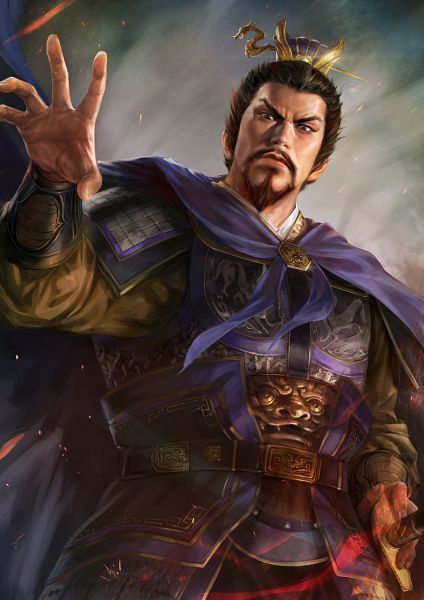
The man himself needs no introduction. Cao Cao is probably the most notable and famous man of te later Han period and is always a central figure in the story adaptations of the Three Kingdoms as a rival to his majesty Zhaolie.
Let me preface by saying that Cao Cao was indeed a great man, the greatest of his time. He led a successful government and led mostly successful campaigns, defeating important odds. My favorite stories regarding the man are those shows of enlightened and kingly governance he occasionally displayed, for he was capable of mercy and kindness.
However, as the title may suggest, this is not a post to talk about his virtue, and in fact I will be using quite harsh words. I think it’s important to add this disclaimer, because it’s not that I think Cao Cao has no qualities worthy of praise, but rather that I will not be singing any more praises other than the ones found on this preface. I am here to harshly criticize him. I want to note that despite my inflammatory remarks towards his person I will be fair in my judgement. Let us begin.
Cao Cao was born into the family of a eunuch and died as king of Wei. Histories often refer to him as Wei Taizu, the temple name bestowed upon him after the ascension of the usurper Cao Pi. Taizu means “Supreme Ancestor”, but I will hereby referm to him as Taizei, “Supreme Rebel”, for that is the most fitting adjective for the man. I will not be talking about his wanton massacres here, but I obviously criticize them as well.
For indeed, Cao Aman was the foremost rebel in the land. In the year 196, Cao Cao loyally and dutifully received his imperial majesty emperor Xiaomin of Han. Upon receiving the Son of Heaven’s entourage, it appears that his arrogance did indeed know no bounds:
Xiàn-dì Chūnqiū states: Shào was ashamed to be ranked below Tàizǔ, and angrily said: “Cáo Cāo was about to die several times, I at once saved him, now he turns back on kindness, seizing Heaven’s Son to command me!” Tàizǔ heard this, and yielded the General-in-Chief position to Shào.
SGZ6, biography of Yuan Shao, translated by Yang Zhengyuan. The writing of Taizu is not mine, nor do I condone it.
As soon as the emperor came into his hands at Xu city in 196, Cao Cao arranged the resignation of the Grand Commandant Yang Biao and the Excellency of Works Zhang Xi. He took Zhang Xi’s title for himself and offered the honour of Grand Commandant to Yuan Shao: the Excellency over the Masses Zhao Wen was allowed to keep his position. All three Excellencies had been appointed by the junta of Li Jue and Guo Si, but none had held any real authority and they had been pawns in the conflict between the quarrelling generals. Their position was now little better; the critical office was the Imperial Secre-tariat, which controlled official correspondence and the proclamation of edicts, and Cao Cao immediately appointed his trusted counsellor Xun Yu to be its Director.
Imperial Warlord by Rafe de Crespigny, page 111
As we see in these passages, Cao Cao’s attitude towards the emperor was complicated, to say the least. He took in the emperor and appointed his cronies to key positions so as to tighten his control over the court. Originally he even gave himself a greater position, but decided to relinquish it in favor of Yuan Shao so as to placate him.
The attitude of His Majesty towards his new protector was not very warm either. Not long after Cao Cao’s taking over the court, the Son of Heaven himself issued a secret decree by which the rebel ought to be punished. Dong Cheng, His Majesty’s relative and close friend, was the main support he had during this plot, but people like Zhaolie also took part in it.
The plot was discovered in the year 200 and the conspirators save for Zhaolie were executed along with their families. One person was the daughter of Dong Cheng, who was an Honored Lady of His Majesty. Despite his pleas, Cao Aman had her executed.
I don’t want my argument to be misunderstood. Clan extermination is harsh, however it was the law of the land and Cao Cao is not particularly heinous for following the customs of his time. It is important to note that clan extermination is reserved for serious crime, like treason. The problem is that Dong Cheng’s noble goal was to rid the dynasty of its primary enemy. It was the emperor’s desire to extirpate sedition and restore the authority that Heaven had bestowed upon him.
Dong Cheng’s actions are only judged as treacherous because he did not succeed. It is unthinkable to call a traitor the one who was executing the emperor’s will while the one abusing his authority gets to judge the emperor’s actions against him as treacherous. Dong Cheng did nothing wrong, and is indeed a tragic hero who did not deserve his fate. He was innocent of every single charge put against him.
In the year 207, Cao Aman subdued the lands north of the Yellow River. It was around this time that Cao Cao resurrected the title of Chengxiang (丞相), Imperial Chancellor or Prime Minister.
This position held remarkable influence and power, so much that it was abolished and was not used during the Later Han period until he revived it. The position of Chancellor was the most important of the Three Excellencies, the highest posts in the imperial bureaucracy, and the reason is that the Chancellor could select the reports that reach the emperor. By selecting proposals to forward to the Son of Heaven, the Chancellor could dictate policy. (The Cambridge History of China, volume 1, 468).
Parallel to this, Cao Cao had set up the city of Ye as his main residence:
Soon after Cao Cao had captured Ye from the Yuan in 204, he adopted the city as his chief residence. The emperor and his puppet court remained at Xu, which continued to be recognised as the formal imperial capital, and Cao Cao was frequently on campaign to the north, south and west, but Ye city and the surrounding territory of Wei commandery became the heart of his power.
Imperial Warlord, page 333
At an early stage of occupation Cao Cao brought numbers of new settlers to develop the region, in the same fashion as the agricultural colonies which he had established at Xu city.
Imperial Warlord, page 334
Even as he thus embellished his capital, Cao Cao established a court to match the emperor’s at Xu city. Under the guidance of Du Kui, who had formerly served Emperor Ling and later took refuge with Liu Biao, he recovered much of the imperial music and enhanced his own ceremonial with suitable compositions and players.
Imperial Warlord, page 339
Ye as capital of Wei commandery would go on to serve as Cao Cao’s de facto capital and center of power. He developed it and constructed palaces so as to awe the land and make his authority known.
As if that were not enough, Cao Cao took further steps towards solidifying his position.The first one was his proclamation as Duke of Wei on the year 213.
Under LaterHan, the title of king (王wang) was reserved for members of the imperial Liu clan,while the notional descendants of the ancient Shang/Yin and Zhou dynasties were granted title as dukes (公gong) and held small fiefs (公國gongguo): Bielenstein, Bureaucracy, 105-109 at 108. Thehighest noble rank available to others was marquis (侯hou), with a fief of varying size and value
To Establish Peace, a translation of the ZZTJ by de Crespigny, year 212, passage K, note 17.
As can be seen in here. Cao Cao’s highest possible title was that of marquis. He could not become a duke as he did not have ancestry related to the dukes of old. Not only that, but Cao Aman also took the Nine Bestowments in 213 upon the formalization of his title as duke of Wei.
The reason this is significant is because the Nine Bestowments were created by the infamous Wang Mang who usurped the Han dynasty 200 years prior. This was an attempt by the foremost rebel of the land to legitimize himself, accumulating honors.
Note that the above passage is a note in the year 212, while his enfeoffment was on the year 213. This means that the decision to name Cao Cao duke was already made beforehand by Cao Cao’s supporters and the emperor’s role was to simply formalize it. It was not something the emperor did willingly and eagerly.
It is precisely his ascension to dukedom that caused a rift between him and his close advisor Xun Yu. As head of the Secretariat, Xun Yu refused to let the appointment as duke go through.
Daolun has argued in the past that this was just a show to garner clout and that Xun Yu was not genuinely loyal to the Han. This may very well be the case, but regardless of his intentions, the truth of the matter is that letting the appointment go through would be seen as an act that goes against the interests of the ruling dynasty.
Cao Cao as a result removed him from his position and granted him a more prestigious one but from which he would not beable to contest Cao Cao’s ascension. There is some debate on whether Xun Yu was ordered to commit suicide or he died of illness. I am inclined to think it is the latter, for Cao Cao had already removed the only obstacle standing on his way to the appointment and kept Xun Yu close to him. However, I do not put it past Cao Aman to betray a close friend. I’ll give him the benefit of the doubt here.
Perhaps more blatant was Cao Cao’s reorganization of the different provinces. He redrew the borders of the provinces to fit the neat number of Nine provinces, like they were in times of the Zhou dynasty. These are the old borders:
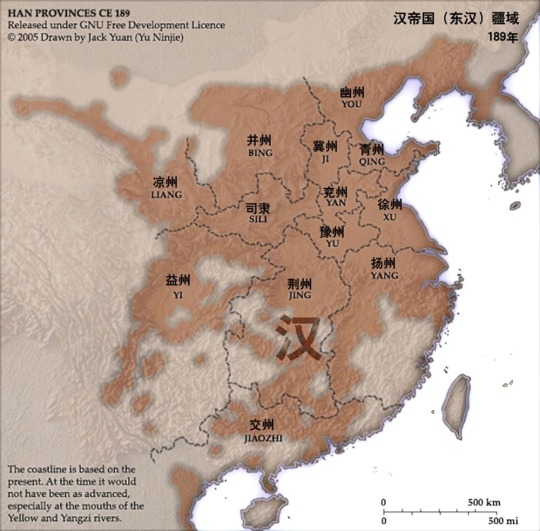
These are the new borders that Cao Cao proposed:
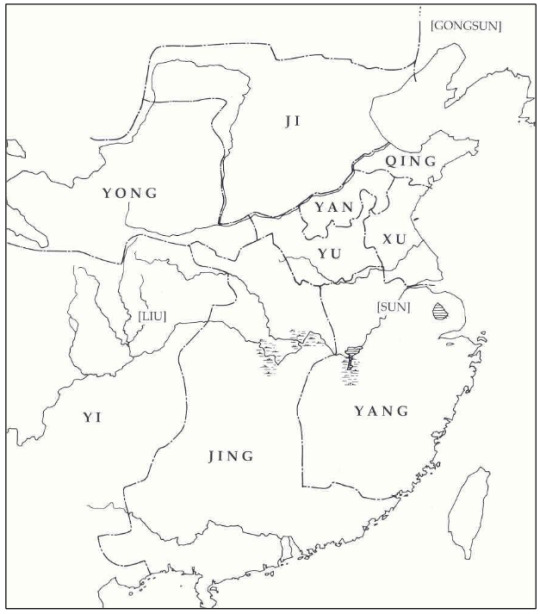
This was made effective in territories he controlled, of course. The most significant change here is the merge of You, Ji and Bing provinces. Cao Cao’s fief of Wei commandery, were Ye was, is located in Ji province and he held governance over the region. He used the previous prestige of the Zhou dynasty to justify his merging of provinces, but this clearly benefitted him, as he had access to an even larger pool of population and land by conveniently making his province absorb the other two.
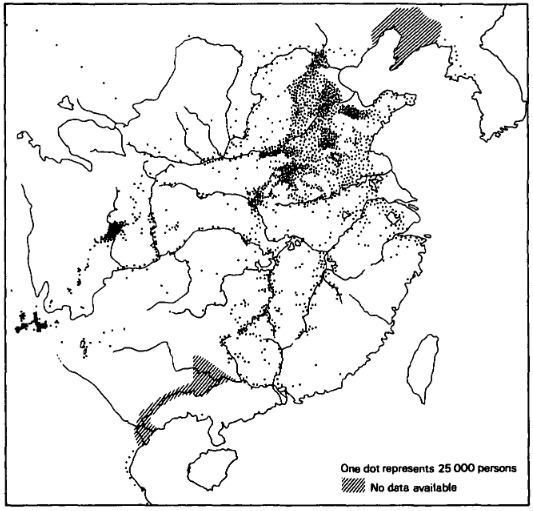
This is a map of the population of the Han empire on the year 140 AD. While bing province was sparsely populated, and maybe even more so at this time, You still had an important concentration of population. This new merged also allowed Cao Cao to control the lands north of the Yellow River, which perhaps can be used as a natural barrier, though not to the extent the Yangzi was.
Regardless, he still had a larger base of power and he would eventually relocate the population of Hanzhong to Ye.
Taizei’s treachery does not end here. On 217 he claimed the title of king. This title, much like the title of Duke, was not one that Cao Cao could claim. Members of the imperial family were sometimes given a fief that worked as a commandery, but was called a kingdom instead.
He kept defying imperial authority by performing ceremonies reserved for independent rulers.
SGZ1:42 records that in the first month of this year Cao Cao undertook for the first time the ceremony of ploughing the sacred field (耕籍田geng jitian), privilege of an independent ruler.
To Establish Peace.
Taking imperial privileges, Cao Cao died (thank God) as king of Wei.
Appraisal
Cao Aman was a traitor. I’d dare to say he was the biggest traitor in the land. Following the example of Wang Mang, he gradually accumulated political power, restricted the actions of his sovereign and acted as the Son of Heaven in all but name. He continually usurped imperial functions, tried to put his lineage in the imperial line, abused his authority constantly and built structures in his own parallel capital so that his authority could rise above that of the same man he vowed to protect.
A man so devoted to the destruction of the Han dynasty cannot be called loyal to the Han dynasty. A man who would exterminate the clan of those trying to remove him from power because they were following the desires of the emperor on charges of treason cannot be called loyal to the Han dynasty. A man who continued to erase every trace of independence the emperor had in the name of his own personal ambition cannot be called loyal to the Han dynasty.
It would be unfair of me to say the destruction of the Han was all his fault. Taizei was merely another player in the time period he got to live in. It was a time where heroes would rise above the level they would expect to rise were they living in times of peace, and the decay of the dynasty was perceived long before he was even born. He was a product of his time.
What makes people like The Marquis so remarkable is that in the face of absolute power they remained incorruptible. Zhuge Liang truly is the epitome of what a minister should be, the perfect example of a man devoted to his sovereign and unwaveringly loyal until the very end. I cannot recriminate this to Cao Cao. His treachery is reprehensible, but not everyone can be a paragon of statesmanship and loyal service. Zhuge Liang is an extremely rare case, how can I realistically blame Cao Cao for not being on his level when the vast majority of men in human history would not behave like Zhuge Liang did were they in Zhuge Liang’s position?
But the truth of the matter still remains. Cao Cao was offered the whether or not to betray the world, and betray the world he did.
0 notes
Text
Tao of Ju jan | Facebook
t.umblr.com
Dec 29, 2019
4 notes
YAKAZA | Facebook
t.umblr.com
Dec 29, 2019
5 notes
Hawk | Facebook
t.umblr.com
Dec 29, 2019
4 notes
Igniting Flames | Facebook
t.umblr.com
Dec 29, 2019
4 notes
Apple intel Mission Statement | Facebook
t.umblr.com
Dec 29, 2019
5 notes
KILL | Facebook
t.umblr.com
Dec 29, 2019
5 notes
Kiss | Facebook
t.umblr.com
Dec 29, 2019
5 notes
Barnes And Noble | Facebook
t.umblr.com
Dec 29, 2019
4 notes
MicroSoft | Facebook
t.umblr.com
Dec 29, 2019
5 notes
Nintendo | Facebook
t.umblr.com
Dec 29, 2019
5 notes
CLOCKERS - WHO’S A ACTUAL CLOCKER - NOT CLOCKER DONT CARRY GLOCKS ( BIV RUGER’S ,MAYBE SO BUT NOT GLOCKS )
(via blaze8403)
Dec 29, 2019
1 note
MicroSoft | Facebook
t.umblr.com
Dec 29, 2019
3 notes
NEO-GEO | Facebook
t.umblr.com
Dec 29, 2019
5 notes
Porsche Mission Statement | Facebook
t.umblr.com
Dec 29, 2019
4 notes
Hello Kitty- MISSION STATEMENT TERRY LEE HAWKINS JR.·FRIDAY, JUNE 30, 2017·2 MINUTES Hello kitty hello kitty hello lady hello kitty hello Miss not A bloody Hello Unless you on you period i guess but bloody Hello the ENGLISH / BRITISH coming out of me i guess Hello to you would you holla back Hello kitty Hello kitty bonjour please excuse my french je suis i am if i am the only one to think of am and pm suis je to say morning and night and that of time or Am Fm or Xm and the radio frequencies like midnight blue or midnight magick the love zone a midnight kiss or midnight or midknight drift just going on feeling with a midnight shift or midnight drag possibly meaning boring as shit unless it’s a car race and then in that case gears may grind as a gear may shift and where blame shift then flames will shift and time and space shall shift call it time shifting or bending time time spent timebinding time bound hello kitty hola kitty my spanish please pardon my espanol but kitty hello and Ciao kitty my italian the wop in me ハローキティ こんにちは Kon'nichiwa forgive my japanese but again hello kitty hello sweet im not sure of my chinese 凯蒂猫 Kǎi dì māo or Korean 헬로 키티 hello kiti but hello indeed like the of candy coated tears or coated raind drops and rainbow winngs hello kitty hello skittles hello kitty hello pet hello love holla back Terry Lee Hawkins Jr. Blaze Pascal Tao of True Religion Circle SIGNED TER BOOPER (BOOP) PEROS NASCAR Movado Hello Kitty
(via blaze8403)
Dec 29, 2019
2 notes
Sega Dream | Facebook
t.umblr.com
Dec 29, 2019
4 notes
Samsung | Facebook
t.umblr.com
Dec 29, 2019
5 notes

Dec 29, 2019
23 notes
Crossed | Facebook
t.umblr.com
Dec 19, 2019
8 notes
Teremiah8403 - NO JUST FALSE DEATH - AND DISCLOSED RECORDS UNTIL M.I.A INDIVIDUAL - MAKES LIVING CONTACT WHO WANT’S TO GO M.I.A I HAVE YOU IF YOU HAVE REASON - BUT YOU NO WHAT YOU HAVE INTENT DO PRIOR BE IT THE RESULTS
Dec 19, 2019
2 notes
MIA OR AIM ( OR I AM ?)
Dec 19, 2019
2 notes
NO KILL OR KISS PEOPLE I DONT KILL PEOPLE I KISS IN LOVING LOVINGNESS EVERYTHING & NOTHINGNESSSWORDWORDSpoemswords reblogged poemswordsYES=Y LIKE Y=YES ( N=NO OR NODACHI)
(via blaze8403)
Dec 19, 2019
1 note
Yin and yang YIN YANG DescriptionIn Ancient Chinese philosophy, yin and yang is a concept of dualism, describing how seemingly opposite or contrary forces may actually be complementary, interconnected, and interdependent in the natural world, and how they may give rise to each other as they interrelate to one another. Wikipedia Hanyu Pinyin: yīnyáng
(via blaze8403)
Dec 19, 2019
1 note
WHITE / BLACK READ / WRITE
Dec 19, 2019
1 note
Owner message
Hess Corporation Congratulates Stocks in the Green up and still affordable Lock 75 % stock safety precautions I never letting anyone try a take over of my company Corporation or hard time and effort From here to Takeda 65.06 USD +0.39 (0.60%) Closed: Dec 18, 4:32 PM EST · Disclaimer After hours 65.06 0.00 (0.00%) Stocks being up Is good unless it’s bad thing and owners like myself likely no why
Dec 19, 2019
2 notes
ITACHI Corp Hess Corporation operations Japan-base of operations Hawkins@Hopkins Hokinsu.
1 note
·
View note
Text
Saturday 23 June 1832
9 ½
12 50
rain in the night finish morning but likely for more rain – F62° at 10 – downstairs at 10 ½ - Kind letter one ½ sheet full and 2pp. of another from Lady Gordon (Tunbridge wells) franked from London by Mr. Frankland Lewis – she will go into Herefordshire in October for the winter to her brother in law Mr. Peploe bad and baggage, and is not sure of going abroad in the spring – most likely will not, for Cosmo may come over – but has no doubt of ‘our suiting very well if our stars ever call us to the same part of the world and we join forces quando sarà quel dì? I am very glad that you liked Miss Hobarts’ futur[e] he looked to me narrow chested and uncomfortable and very Scottish pray write to me’ I am to enclose to the right honourable Frankland Lewis 19 Henrietta Stuart London – out at 12 with Steel to fell the ash tree I had so begged to have down – (felled in 20 minutes) CN- came – thought the gap made too great, and that it looked better before – Mrs. N- thought nor good nor harm was done – IN- alone agreed with me – sauntered about till after 1 – then came in – wrote the following to Mr. Hawkins – ‘Langton hall Saturday 23 June 1832 Miss Lister will be much obliged to Mr. Hawkins to order her newspaper on Monday and to be in future directed to her at Shibden hall near Halifax Yorkshire’ – gave for the post, to go by Mrs. Norcliffe going to call on Mrs. Robert Bower my letter to ‘Mr. Hawkins 26 Dover street London post paid’ Mrs. N- and CN- off in the carriage at 2 ¼ took to me and set me down at the far end of the wold – fine high wholesome – walked about on the top of the wold and enjoyed it – home at - saw the haymaking machine from London price £18.7.0 – will do a great deal of work – dressed – dinner at 5 – finished notes from Norcliffes’ tours – ½ hour alone with CN- came to my room at 11 ¾ and had her 20 minutes more with me – a very little light rain between 10 and 11 – afterwards finish day and evening – enjoyed my walk on the wold – F61° now at 12 10 tonight
1 note
·
View note
Note
Qin Lang was Cao Pi's half-brother through one of Cao Cao's concubines, right? How was he allowed to attain high rank instead of being stuck on an estate somewhere?
Qin Lang was kind of an unusual case (along with He Yan). He wasn't Cao Pi's half-brother; he was closer to a step-brother or foster-brother. He wasn't actually a blood relative of Wei's imperial family, so he was not made a prince and was not regarded as a potential rival to the throne.
Some annotations in SGZ 3 expand upon his background and personality.
Wèishì Chūnqiū states: [Qín] Lǎng appellation Yuánmíng was a Xīnxīng man.
Xiàn-dì zhuàn states: [Qín] Lǎng's father was named [Qín] Yílù, and was by Lǚ Bù sent as envoy to visit Yuán Shù. [Yuán] Shù wed him to a daughter of the Hàn Imperial Clan. His previous wife lady Dù remained at Xiàpī. When [Lǚ] Bù was besieged, Guān Yǔ repeatedly requested from Tàizǔ [Cáo Cāo] for lady Dù to take as a wife, so Tàizǔ suspected she had beauty. When the city was taken, Tàizǔ met her, and therefore accepted her himself [as a concubine]. [Qín] Yílù returned and surrendered, and was appointed Zhì Chief. When Liú Bèi fled toXiǎopèi [200], Zhāng Fēi accompanied him, and passing by said to [Qín] Yílù: "A man took your wife, but you are employed [by him] as a [county] Chief, so then you act like an ignorant worm like this! Why not join us and go?" [Qín] Yílù followed them for several lǐ but regretted it and wished to return, so [Zhāng] Fēi killed him. [Qín] Lǎng accompanied his mother to live in the Excellency's palace, and Tàizǔ deeply favored him. Every time he sat at banquet, he said to the guests: "Does the world have anyone who loves his adopted son as much as me?"
Wèi lüè states: [Qín] Lǎng traveled about together with the various lords [Cáo Cāo's sons], but during the times of Wǔ [Cáo Cāo] and Wén [Cáo Pī] he was not exceptional. When Emperor Míng succeeded the throne, he was awarded with an inner position, became Valiant Cavalry General and Dispensing Matters Internal. Every time the Imperial Carriage set out and came in, [Qín] Lǎng always accompanied. At the time Emperor Míng enjoyed [personally prosecuting [legal cases], and several times there were trivial offenses that received great [capital] punishments. [Qín] Lǎng to the end did not remonstrate to stop, and also never once advanced a worthy person [for office], but the Emperor kept him in close favor, always consulted him, frequently called him by his childhood appellation Ā'sū, repeatedly bestowed rewards, and for him raised a great mansion inside the capital city. Though [everyone across] the Four Quarters knew [Qín] Lǎng had no ability or use, yet he was closely trusted and utmostly honored, so many went to bribe him, and his wealth matched the Excellencies and lords.
4 notes
·
View notes
Text
Bilbo: Thorin and I don't use pet names.
Dis: I see. Hey, what do bees make?
Bilbo: Honey?
Thorin: Yes, dear?
Bilbo:
Dis: Don't ever lie to my face again.
#bagginshield#thorin oakenshield#bilbo baggins#lady dìs#the hobbit#the hobbit incorrect quotes#source: ???
226 notes
·
View notes